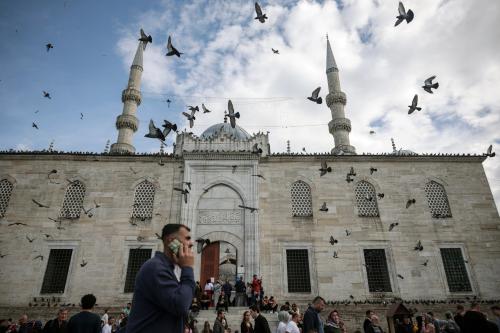A new book shows how some Americans use Muslims as a way to define who they themselves are and what they stand for, and to sharpen their definition of Western civilization. Shadi Hamid writes that trying to make Islam digestible to non-Muslims by making it peaceful and legally ambivalent may only inspire more confusion. This piece originally appeared in the Washington Post.
Americans are obsessed with Islam as an idea, as a mystery and as an existential threat to the West. As a result, our debates over Islam and Muslims aren’t really about “them” as much as they are about “us”—and the supposed battle between the two. In his new book, “What the Qur’an Meant: And Why It Matters,” historian Garry Wills shows how some Americans use Muslims as a way to define who they themselves are and what they stand for, and to sharpen their definition of Western civilization.
The 2016 presidential race was a case in point. As Wills writes, “The crowded field of Republican candidates sounded, at times, as if they were running against Islam, not against Democrats.” Wills, the author of “Why I Am a Catholic” and “Why Priests?,” comes at Islam as a sympathetic outsider or, more precisely, an outsider who wants to be as sympathetic as he’s able to be.
Like many well-meaning observers, Wills hopes to educate readers about Islam in an effort to defuse Islamophobia. His book is directed at those who know little about the religion beyond what they glean from unsavory headlines. His premise is noble enough: that ignorance can be fought with knowledge. If only more people became more informed about the Koran, they might not believe those who insist that Islam is a dangerous religion. So it’s hard to fault Wills for some cliched reassurances. For example, he writes of al-Qaeda and the soldiers of the Islamic State: “The minority fanatics seem to be unaware of their own traditions.”
Here, Wills shows that his knowledge of the Islamic State’s theology is sometimes limited. The problem isn’t that Islamic State chief Abu Bakr al-Baghdadi is unaware of more broad-minded interpretations of the Koran; it’s that he thinks they’re wrong. As Yale University’s Mara Revkin has shown, the Islamic State was built on a complex legal structure and could have been worked out only by people intimately familiar with Islamic legal precepts (however extreme and idiosyncratic their understanding of them).
The Islamic State’s Salafi-jihadist rendering of Islam—a kind of originalist approach to the canonical texts—is appealing to its followers precisely because it distrusts accumulated tradition that has helped Muslims adapt Islamic law for changing times. For the Islamic State’s ideologues, modernity has bent Islam to its will, and their job is to reverse that process. If there were slaves and concubines in the prophet’s time, for instance, then there must be in all times.
Wills sometimes seeks to present Islam as something it never was. For instance, he claims that a “mountain of evidence” demonstrates that “Islam favors peace over violence.” But Islam is not a pacifist religion. For centuries, Muslim jurists developed a body of law on the waging of war, including how to treat prisoners and civilians caught in conflict and the definition of what properly qualifies as jihad. Wills leaves an intriguing question unanswered: Why should Islam be pacifist in the first place? Since religions are more than just private belief systems, they inevitably must account not only for the ideal of peace but for the reality of war. The Koran was revealed to a prophet and a people engaged in battle, so Islam would necessarily have to address questions of violence and the conquest of territory by force. Before modern norms challenged the violent acquistion and annexation of territory, groups had to capture, hold and govern areas by force; no one voluntarily lets you take their land.
Wills makes other claims that are simply misleading, as when he asserts that “there are no ‘portions’ of the Qur’an that discuss Shari’ah.” In support of his argument, he says that only about 500 of the Koran’s 6,235 verses deal with legal matters. The Koran is not a legal manual, but 8 percent of a book isn’t exactly nothing, either. The holy book is one of the major sources for interpreting sharia. Wills’s presumption appears to be that a religion having something to say about law is a negative thing and must therefore be played down.
In a modern liberal context, the law explicitly belongs to the realm of politics and governance, while religion is seen as something separate, sacred and personal. This is not only a modern conception of law—a product of the nation-state system and the Enlightenment’s preoccupation with the rational—but a distinctly Christian one as well. Wills appears to be reading this Christian understanding of religion into Islam. A “good” Islam—the one he introduces to readers—is basically peaceful and, like Christianity, bereft of a serious legal code.
Sharia, which encompasses Islamic law but also private rituals such as praying and fasting, cannot be found in any one place, evolving as it did through precedent and practice. Islam has quite a bit to say about public and political behavior, apparently making it, in Wills’s eyes, difficult for Christian and nonreligious readers to comprehend. This probably plays some part in his tendency to offer awkward asides, at once patronizing and over-earnest, such as: “Some people might be surprised to hear there is such a thing as a Muslim feminist. In fact, there are many of them.” Yes, there are many of them. Why wouldn’t there be, is the more useful question to pose.
I have mixed feelings about emphasizing these faults. This is not a book by a scholar of Islam, so it shouldn’t be judged for its lack of originality. It is a book for people who know little about the religion. But if the millions of Americans who found themselves suspicious of Muslims weren’t already reassured by George W. Bush’s pronouncements of Islam as a religion of peace, it’s unclear why Wills would do much better. I also worry about the unintended effects of trying to soften Islam’s image or dilute its content. Trying to make Islam digestible to non-Muslims by making it peaceful and legally ambivalent may only inspire more confusion. What happens when, after reading about this palatable, peaceful and unthreatening religion, Americans are confronted by a version of it that is unapologetically assertive and uncompromising?
The Brookings Institution is committed to quality, independence, and impact.
We are supported by a diverse array of funders. In line with our values and policies, each Brookings publication represents the sole views of its author(s).








Commentary
Educating Americans to defuse Islamaphobia
November 16, 2017